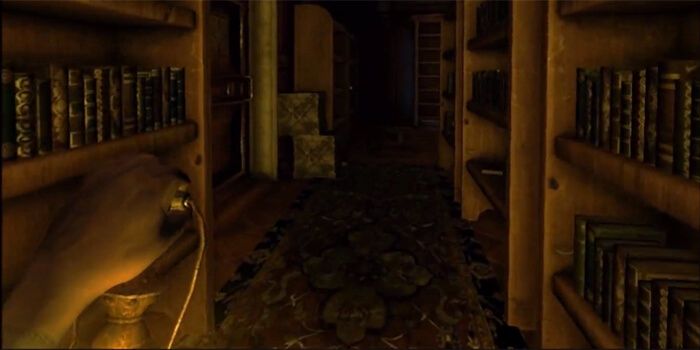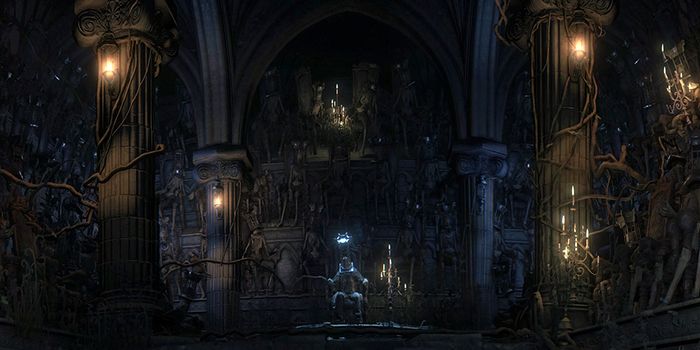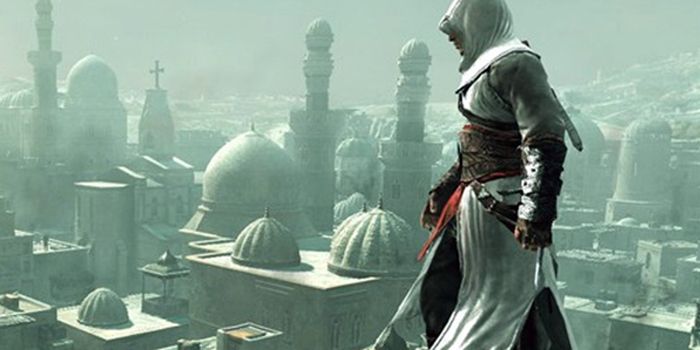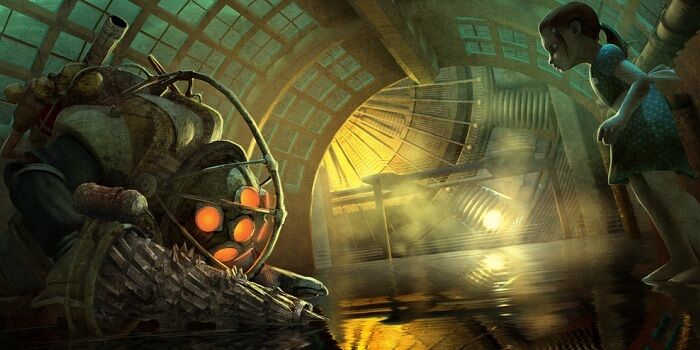Games tend to work best when they're inspired by, rather than direct adaptations of other media. This tendency makes sense because games are immersive in a unique way. Games make the player an active participant rather than a voyeur, reading from someone else's perspective or watching a multitude of people act out a story. Even if a player doesn't personally identify with their character in a game, there's still a level of immersion that's totally unique.
Literary games are interesting because they turn concepts into mechanics and let us enact new stories in familiar settings. While many games are inspired by books in one way or another, these are some top-notch literary games.
The Horror of Time and Space in Bloodborne
If you don't look too closely, it would be easy to write Bloodborne off as a typical Victorian horror story. It's not so much that Bloodborne is a direct adaptation of any one work, but rather that it draws heavily on an entire genre: cosmic horror, especially as written by H. P. Lovecraft. This isn't horror that threatens you with death— this is horror that looms just beyond your understanding, driving you slowly insane with each tidbit you come to understand.
Lovecraftian horror unravels in dreams and space and time, dwarfing humanity next to incomprehensible monsters. A common theme throughout is the small role an individual human plays in comparison to the unending expanse of time.
Adaptations of Lovecraft's work aren't unusual. But what Bloodborne does uncommonly well is to play on the concept of a Lovecraftian protagonist; someone on the brink of madness (as outlined in this SPOILER-FILLED video). The game's insight collection and frenzy state whittle away at the protagonist's mind as they encounter various Lovecraftian monsters. The way that certain enemies interact with the player only reinforce this interpretation. The world of Yharnam isn't too far removed from a Lovecraftian setting, and the influence is certainly there, but the way that Bloodborne makes use of these ideas is wholly unique.
_____________________________________________
Page 2: The Adventures of Geralt
_____________________________________________
Thinking Outside the Page in The Witcher
The Witcher is one of the most highly anticipated games coming out this year. But what many fans of the series don't know is that it's inspired by a Polish book series by Andrzej Sapkowski. Sapkowski hasn't really attained the same level of fame in the US that he enjoys in Poland—a fact that many fans of the series blame on poor English translations—but the series is an incredibly popular fantasy game, and with good reason.
While clearly inspired by the novels, The Witcher series also reinvents the existing world for a new demographic. The games begin where the novels leaves off, allowing the developers to make literary games in an established world while telling entirely new stories.
The Witcher book series lends itself well to adaptation, as Geralt's powers and character make him an interesting fantasy character. By designing a familiar character to face brand-new stories, the developers can create a game that doesn't step on the toes of the source material but opens it up to exploration and experimentation.
The adaptation isn't without its faults, but plenty of fans of the books are having fun playing The Witcher, and the games have even brought more fans to the book series. It strikes the perfect balance between homage and originality, exposing fans to new media on both sides.
_____________________________________________
Page 2: The Assassin-Templar War
_____________________________________________
History, Myth, and Literature Combine in Assassin's Creed
Assassin's Creed takes more of the Bloodborne approach to literary games, as this series draws heavy inspiration from a variety of sources rather than purely adopting the plot or main character of one piece of fiction in particular.
Assassin's Creed is partially inspired by Alamut, written by Slovenian-born Vladimir Bartol. The novel depicts an order of valiant, nearly fanatic soldiers called the fedai. The fedai have been told by their leader, Hassan-i Sabbah, that if they die in service of their order, their place in heaven is assured. This ideology produces absolutely loyalty among the soldiers. Hassan can order his soldiers to commit suicide to prove their loyalty and he shows no compunction about doing so, ordering a soldier to jump off a tower in much the same way that it happens in the game.
Even more influential is Hassan's motto: "Nothing is an absolute reality; all is permitted." In the game, this motto translates to: "Nothing is true; everything is permitted," underlining the game's use of a frame narrative to allow freedom within the historical worlds. It's also the creed's maxim, ensuring that all assassins understand that nothing is "true" in the sense that everything can be changed, including what is perceived to be the natural order of the world.
_____________________________________________
Page 4: More Popular Literary Games
_____________________________________________
Other Popular Literary Games
Middle-earth: Shadow of Mordor: J. R. R. Tolkien's Middle-earth is one of the most recognizable and beloved fictional worlds, and its vast scope, myriad cultures, and numerous clashes make it the perfect setting for stories set between the novels.
The Binding of Isaac: Biting, sad, and controversial, The Binding of Isaac looks at the biblical story of Abraham and Isaac in a modern setting.
Dynasty Warriors: Aside from being a fun power fantasy where you slaughter your way through outrageous numbers of enemies, Dynasty Warriors is also a retelling of the Romance of the Three Kingdoms, a 14th-century Chinese text.
BioShock: BioShock isn't exactly subtle in the way it draws from Ayn Rand's Atlas Shrugged, but its extrapolation of her philosophy is an interesting example of drawing inspiration from a literary work.





